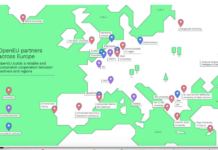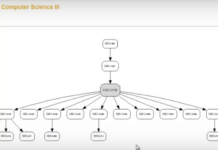Originally created by Natasha Boskic
Branston, C. (2006). From game studies to bibliographic gaming: Libraries tap into the video game culture. Bulletin of the American Society for Information Science & Technology, 32(4), 24-29.
Bandura, A. (2002). Selective moral disengagement in the exercise of moral agency. Journal of Moral Education, 31 (2), 101-119.
Baudrillard, J. (1988). Simulacra and simulations. In M. Poster (Ed.), Selected writings (pp.166-184). Stanford; Stanford University Press.
Blunt, R. (2009) ‘Do serious games work? Results from three studies’ eLearn Magazine, December 1.
This article offers evidence of game use effectiveness to academic achievements. The paper presents the results of three quantitative studies conducted at an east coast university with one first-year and two third-year undergraduate classes. The students were divided into a control group (learning without a game use) and an experimental group (learning with a game use). According to the findings and Blunt “at least in some circumstances, the application of serious games significantly increases learning.” [However, learning is not defined except as ‘performance on tests’].
Brown, J. S. (2000). ‘Growing up digital: How the web changes work, education, and the ways people learn’. Change, (March/April), 11-20.
Bronson, P. and Merryman, A. (2009) New Research: $13 Christmas gifts = 13 point gain in kids’ IQ Newsweek, December 10.
According to Dr. Silvia Bunge, a neuroscientist at UC Berkeley, children’s IQ will increase after a number of hours of playing carefully selected games. After 20 hours of game playing, Dr. Bunge and her team was able to determine an increase in children’s IQ. They tested kids’ reasoning abilities and their processing speed. The positive results encouraged the neuroscientists to broaden their research and look for more school participants. Newsweek blog published an article about the Bunge Lab’s study on reasoning training in local schools and their results at http://www.blog.newsweek.com/blogs/nurtureshock/archive/2009/12/10.aspx [Note: the urls are now dead – if there is another url for this, please let me know]
de Castell, S., Jenson, J., & Taylor, N. (2007). Digital games for education: When meanings play. Situated Play, DiGRA Conference, Tokyo, Japan. 590-599.
de Freitas, S., & Griffiths, M. (2008). ‘The convergence of gaming practices with other media forms: What potential for learning? A review of the literature’. Learning, Media, & Technology, 33(1), 11-20.
DiSalvo, B., Crowley, K., & Norwood, R. (2008). Learning in context: Digital games and young black men. Games and Culture, 3(2), 131-141.
Duperray, C. (2009) Combating Yellow Fever: A Serious Game eLearning Africa, No.4, March 12[Note: the url is now dead – if there is another url for this, please let me know]
The World Health Organization (WHO) in collaboration with the Agence de Médecine Préventive (AMP) have developed an immersive distance training tool using serious gaming, which is now available for physicians all across Africa. The CD-ROM offers the chance to play the role of the District Medical Officer, the epidemiologist or the virologist, and thus be an actor in an epidemiological investigation.
Eskelinen, M. (2001). The gaming situation. Game Studies, 1(1)
Flanagan, M. (2006). Making games for social change. AI & Society, 20(4), 493-505.
Hayles, N. K. (2007). Hyper and deep attention: The generational divide in cognitive modes. Profession, 187-199.
Helm, B. (2005). Educational games crank up the fun. BusinessWeek, August 23, 2005. [Note: the url is now dead – if there is another url for this, please let me know]
Jagodzinski, J. (2007). Videogame cybersubjects: Questioning the myths of violence and identification (implications for educational technologies). The Alberta Journal of Educational Research, 53(1), 45-62.
Juul, J. (2008b). The magic circle and the puzzle piece. Paper presented at the Philosophy of Computer Games, Potsdam, Germany. 056-067.
Juul, J. (2008c). Who made the magic circle? Seeking the solvable part of the game-player problem The Philosophy of Computer Games, 2008.Potsdam, Germany. (Audio recording).
Kafai, Y. B. (2006). Playing and making games for learning: Instructionist and constructionist perspectives for game studies. Games and Culture, 1(1), 36-40.
Klopfer, E. et al. (2009) Moving educational games forward Cambridge MA: MIT The Education Arcade. A useful introduction to some of the issues around educational gaming.
Kupperman, J., Stanzler, J., Fahy, M., & Hapgood, S. (2007). Games, school and the benefits of inefficiency. The International Journal of Learning, 13(9), 161-168.
Murray, J. H. (2006). Toward a cultural theory of gaming: Digital games and the co-evolution of media, mind, and culture. Popular Communication, 4(3), 185-202.
My Thai, A. et al. (2009) Game Changer New York: Joan Ganz Cooney Center Sesame Workshop
Pivec, M. (2007). Play and learn: Potentials of game-based learning. British Journal of Educational Technology, 38(3), 387-393.
Rice, J. (2010). New 3D Learning Book by Karl Kapp. Educational Games Research: Research and discussion concerning instructional video games. February 8, 2010.
Ryan, M. L. (2005). Narrative and the split condition of digital textuality. Dichtung-Digital, 1
Sauvé, L. (2010) Dr Louise Sauvé, the Society for Lifelong Learning and“1,2,3 Asthma” e-Learning Africa 2010 News Portal, March 31.
An interview with Dr. Fauvé about ‘1,2,3 Asthma’, a variation of Parcheesi, an ancient Indian game of crosses and circles. Each team advances to move its four virtual counters around the board. To earn points along the way, you need to answer a number of questions about asthma, how to prevent it, control it and about what triggers the attacks. Questions vary in difficulty. Video and sound clips offer additional information and widen the players’ knowledge of asthma, which affects 300 million people worldwide. Dr. Fauvé is President and General Director of SAVIE, the Society for Lifelong Learning, based in Québec
Wardrip-Fruin, N. (2005). Playable media and textual instruments. Dichtung-Digital, 1.
Zagal, J. P., & Bruckman, A. (2008). Novices, gamers, and scholars: Exploring the challenges of teaching about games. Game Studies, 8(2).









 Dr. Tony Bates is the author of eleven books in the field of online learning and distance education. He has provided consulting services specializing in training in the planning and management of online learning and distance education, working with over 40 organizations in 25 countries. Tony is a Research Associate with Contact North | Contact Nord, Ontario’s Distance Education & Training Network.
Dr. Tony Bates is the author of eleven books in the field of online learning and distance education. He has provided consulting services specializing in training in the planning and management of online learning and distance education, working with over 40 organizations in 25 countries. Tony is a Research Associate with Contact North | Contact Nord, Ontario’s Distance Education & Training Network.

